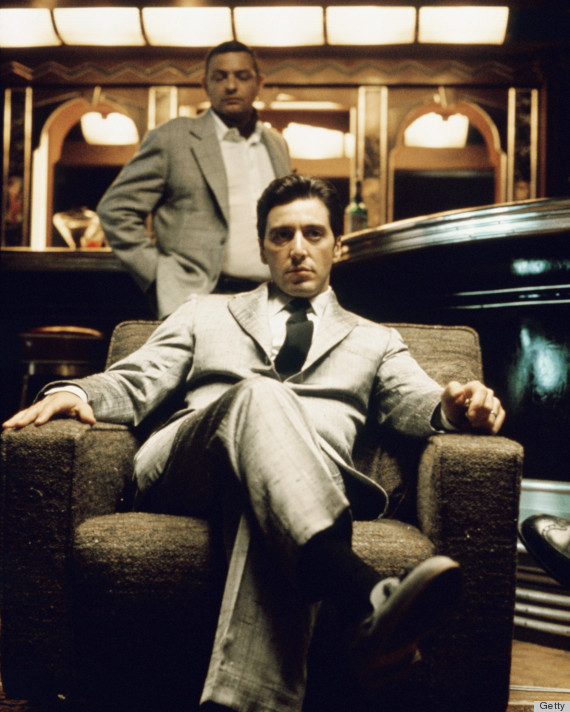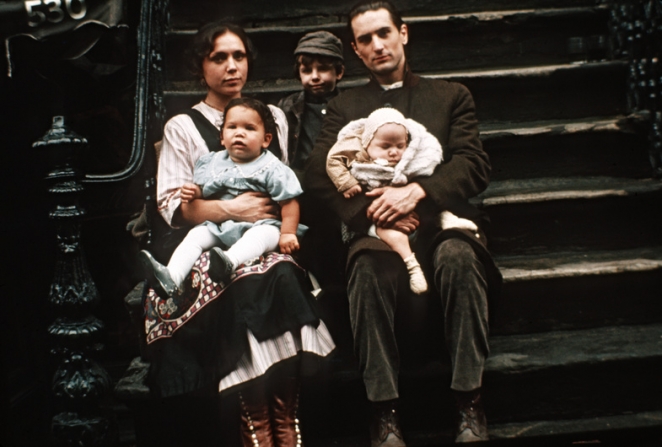The Godfather Part II (1974)

DIRECTOR: Francis Ford Coppola
CAST: Al Pacino, Robert De Niro, Diane Keaton, Robert Duvall, John Cazale, Talia Shire, Lee Strasberg
REVIEW:
A companion piece in the true sense of the word and regarded as arguably the best sequel ever made, The Godfather Part II (which was greenlit before the first movie was even released) only further deepens and enrichens the characters and themes from its predecessor while Francis Ford Coppola and Mario Puzo weave an even more ambitious web. Like The Lord of the Rings, The Godfather and The Godfather Part II are less a film series than one combined continuous story rightfully taken as a whole.
This time, we jump in time between two disconnected stories telling of different eras in the life and times of the Corleone family. In 1958, the Corleone family, presided over by its new “Godfather” Michael (Al Pacino), has relocated from New York City to Lake Tahoe, Nevada where Michael continues to rule over the casinos and hotels he took by force in the climax of the first film and is further expanding the business empire while floating a vague promise to his wife Kay (Diane Keaton) to eventually go legitimate. But trouble arises in the form of old family friend Frankie Pentangeli (Michael V. Gazzo), who visits from New York asking Michael for help eliminating his competition, which Michael refuses because it could disrupt lucrative business dealings with the elderly and ailing but powerful and influential Jewish mobster Hyman Roth (Lee Strasberg). When Michael narrowly survives an assassination attempt from an unknown party, he follows his father’s old advice to keep his friends close and his enemies closer, cinching business deals in Miami and pre-revolution Cuba while trying to sniff out a traitor in his own inner circle. Meanwhile, we periodically flashback to how the Corleone crime empire got its start, with a young Vito Andolini from Corleone, Sicily fleeing the murder of his family to Ellis Island and growing up into an honest working family man (Robert De Niro) who befriends a young Clemenza (Bruno Kirby) and is drawn into a life of crime, first as a petty crook and then taking on the neighborhood boss, Don Fanucci (Gastone Moschin).
Again, Coppola is a master of atmosphere, mood, and period. Period details are impeccable and convincing, both in the 1950s sequences and in those of 1901 and 1917, including expensive recreations of turn-of-the-century Ellis Island, 1917 Little Italy, and 1950s Cuba on the eve of the revolution. The time-jumping split narrative allows for further contrasts to be drawn between Vito and Michael. Vito’s sepia-toned flashbacks hold a nostalgic tinge, and we see Vito intervening on behalf of a widow about to be evicted from her apartment and standing up for his powerless friends in the neighborhood against the bullying Don Fanucci. By contrast, Michael has become a cold, ruthless, closed-off figure who lurks vampirically in his dimly-lit, cave-like office and is often in half-shadow. He would tell you that his every action is taken in the name of protecting “the family”, but ultimately he succeeds only in alienating himself from everyone around him (the contrast is never starker or more obvious than in young Vito’s final scene, posing proudly with his family, versus the final shot of a brooding Michael sitting alone). Vito is not whitewashed—we get a grisly reminder that he is capable of brutality—but in the end, it’s clear who is the more ruthless man, and that while Michael may have retained some of his father’s values, he has perhaps lost track of the most important ones.

The Godfather Part II is not as elegantly-plotted as the original. There are times when the flashbacks to young Vito interrupt the more central Michael storyline, especially after the early assassination attempt (some of Coppola’s friends advised him to leave out the Vito flashback material and focus entirely on Michael, but he refused), although for the most part, Coppola transitions back-and-forth smoothly and clearly (the young Vito sequences take up a total of about forty-five minutes, leaving Michael with the lion’s share of central focus), and the back-and-forth maneuvering in the web of intrigue involving Michael and Hyman Roth is a little convoluted and murky to follow the particulars of. Like many a sequel, the filmmakers attempt to open up the action and paint on a broader canvas here, including both the 1917 flashbacks and the midway detour to Cuba, but opening up the intimate settings occasionally dilute the impact of interpersonal conflicts. Some of this stuff slightly drags and doesn’t quite maintain the consistent absorption over a formidable three hour runtime of its predecessor. On the other hand, there are moments as powerful and iconic as those in the original, including Coppola again bringing palpable slow burn tension to various assassinations or assassination attempts, Michael’s reaction to the identity of the traitor in his midst (“you broke my heart”), and a conclusion that makes the conclusion of the first movie look uplifting by comparison. Here, the body count is lower, but the impact is more devastating.
Al Pacino gets to play a Michael who’s further down the path of darkness he began in the first film, and while Pacino is still low-key and restrained for the most part, he conveys a simmering intensity beneath a carefully controlled exterior, only rarely escaping in a brief explosive burst. There’s an increasing hollowness in his eyes, as if we’re watching whatever life and humanity remains in him slowly flicker out, but there’s also the sense that, like a snake, he is coiled up and ready to strike. Returning characters like Robert Duvall’s inscrutable Tom Hagen, Diane Keaton’s increasingly frustrated Kay, and John Cazale’s weak, resentful Fredo get more focus. The two biggest newcomers are Robert De Niro, who speaks almost all of his role in subtitled Sicilian dialect and does an effective enough job of imitating a younger, less pronounced variation of Marlon Brando’s iconic husky whisper, and legendary acting teacher Lee Strasberg in a rare onscreen acting role, who plays the “big bad” Hyman Roth with a low-key, soft-spoken exterior that belies the manipulative spider at the center of the web of intrigue targeting Michael. Smaller roles include G.D. Spradlin as a Senator in business with the Corleones, Troy Donahue as Connie’s prospective husband, and Harry Dean Stanton in a bit part as an FBI agent.
Ultimately, while sacrificing a little of the first film’s elegant plotting to a split narrative and sometimes convoluted machinations, The Godfather Part II, as its title suggests, feels very much of a piece with its predecessor and the two films are deservedly regarded as a one two punch of superlative cinematic craftsmanship. It’s not quite perfection, but it still comes close.
* * * 1/2